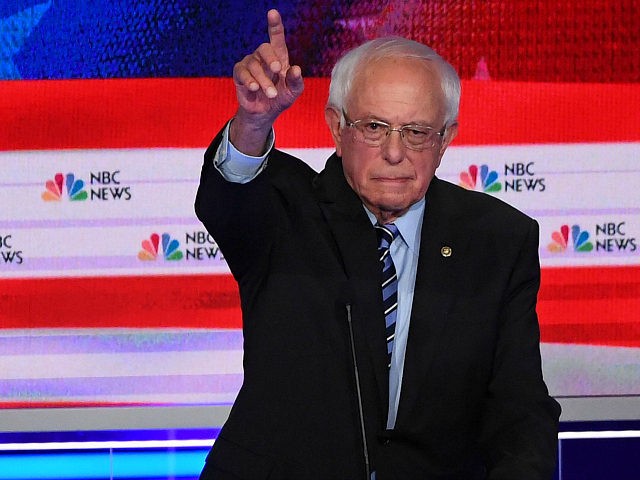San Juan mayor and Bernie Sanders campaign co-chair Carmen Yulín Cruz refused to condemn the violent dictatorships of Cuba and Venezuela in an interview with Univisión on Sunday, comparing the humanitarian crisis in Venezuela to poverty in Puerto Rico and referring to a radical leftist terrorist as a “political prisoner.”
Speaking to Al Punto host Jorge Ramos, Cruz also falsely corrected Ramos when he referred to Sanders as a socialist (Sanders has called himself “socialist” for decades) and admitted that she herself does not identify with the term “socialist” because many Americans, “especially Latinos,” understand that socialism is an authoritarian ideology. She credited Sanders, however, for normalizing radical socialism and identified this as one of the reasons she joined his campaign for president.
Cruz rose to national prominence in the aftermath of Hurricane Maria, appearing on cable news and accusing President Donald Trump of violating the human rights of Puerto Ricans. She has since become one of the few Latinos to support Sanders publicly; largely thanks to the Democrats’ significant shift leftward, Latino voters are increasingly supporting Trump.
While broadcast on television on Sunday, the interview began to circulate widely on social media after Florida radio host Jorge Bonilla isolated the questions about Cuba and Venezuela.
WATCH as @BernieSanders natl co-chair @CarmenYulinCruz equates convicted FALN terrorist Oscar Lopez Rivera with political prisoners in Cuba and Venezuela, after refusing to condemn these dictatorships pic.twitter.com/NxS2ADRxUE
— Jorge Bonilla (@BonillaJL) July 9, 2019
El momento en el que @CarmenYulinCruz compara la situación de PR con Venezuela, tras negarse a criticar al eje castromadurista en @AlPunto pic.twitter.com/voykv3NBNt
— Jorge Bonilla (@BonillaJL) July 7, 2019
Ramos, who was arrested and deported last year in Venezuela for asking dictator Nicolás Maduro to justify imprisoning hundreds of political dissidents, asked Cruz to explain to the audience why she chose Sanders, a self-described socialist, over other presidential candidates.
“Bernie has three fundamental things: he is committed to the causes he fights for, he follows through, and he has courage and bravery,” Cruz replied. “He does not do things because they are politically correct. In 2016, Bernie Sanders ran and the things that he promised were radical. Now, a lot of North Americans, a lot of Latinos, are seeing in Bernie Sanders that person who not only changed the conversation, but is capable of transforming the country.”
Cruz repeatedly rejected Ramos’s assertions that Sanders is a “socialist.”
“He defines himself as a social democrat. I do not define myself that way, but I define myself with [sic] the progressive agenda that he is talking about,” she said.
When pressed on why she does not personally identify as a socialist, she did not reject the ideology, only the political damage that using the term can inflict on a politician in the eyes of the Hispanic community.
“It’s that I think, Jorge, that when we talk about the word ‘socialism,’ especially for Latinos, it has a connotation that deviates us away from the conversation,” Cruz said, one that invokes “authoritarianism.”
“But he uses the word ‘socialism,'” Ramos replied, referring to Sanders. Cruz wagged her finger at the journalist and insisted, “social democrat.”
“I am a socialist and everyone knows that,” Sanders said in 1990, dismissing a campaign ad against him. Nearly two decades later, he described himself as a “socialist” on his Senate website. He used the term for his ideology repeatedly throughout his career, only appearing to backtrack during the current presidential campaign.
Ramos then moves on to ask about Cuba and its colony, Venezuela, whose humanitarian catastrophe is at the top of Latinos’ political concerns.
“Can you be a socialist or social democrat and criticize Venezuela and Cuba?” Ramos asks.
Cruz never says no, but she does not condemn either country.
“That is precisely why I distance myself from that characterization, because then we enter into another totally different conversation,” she replies initially. After some crosstalk, Ramos attempts to repeat the question clearly: “I don’t know if you can criticize Cuba and Venezuela and some Latinos –”
“Some criticize me for not criticizing,” Cruz retorts, “Being a colony of the United States –”
“I don’t understand, truly, in all honesty, I don’t understand why you don’t want to criticize Cuba and Venezuela when we all widely know that these are two dictatorships that violate human rights, where there are political prisoners, where there is no free press,” Ramos interjects.
“Puerto Rico’s the last political prisoner was released on January 17, 2o17,” Cruz replies, referring to Oscar López Rivera, a Puerto Rican nationalist terrorist whose group placed more than 130 bombs throughout the United States and is believed to have killed at least five, wounded dozens, and caused over $3 million in property damage.
President Barack Obama pardoned him shortly before the end of his tenure.
Ramos asked his question a third time, once again failing to receive a condemnation of two of the most brutal rogue regimes in the world.
“I can tell you the following: as long as Puerto Rico remains a colony of the United States, my efforts, totally, will be directed towards the elimination of poverty in Puerto Rico, where 1.3 million people need food assistance to eat,” Cruz said. “That is where all my energy is. … I realize you had a personal experience… that complicated experience, we live every day in Puerto Rico for being a colony of the United States.”
The “personal experience” Cruz referred to was Ramos’ arrest in Venezuela, after showing Maduro a list of prisoners of conscience in the country. She did not explain how a journalist being arrested for conducting an interview is an experience all Puerto Ricans live through on a daily basis, as she claimed.

COMMENTS
Please let us know if you're having issues with commenting.